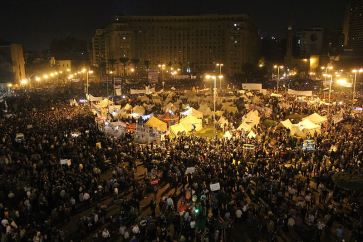Egyptians are voting on a disputed new constitution that has split the country in two and sparked deadly protests. Liberal opposition condemns the document as too Islamist, curtailing the rights of Egyptian minority groups.
Polls opened at 8:00 pm local time (6:00 GMT) in Cairo, Alexandria and eight other regions in the first round of voting. Egypt’s remaining regions will get their chance to vote on December 22. The referendum has been split over two days as there are not enough members of the judiciary to monitor the process after some pledged to boycott the vote.
If the new constitution is rejected, another document will have to be drafted in a process that could take nine months.
Over half of Egypt’s 51 million registered voters are expected to make their way to the polls this Saturday.
The first round’s unofficial results are expected hours after the polling stations close.
Tensions over the vote reached a boiling point in Egypt’s second largest city Alexandria on Friday night as 2,000 Morsi supporters gathered outside the city’s central Mosque in support of the constitution.
The Ire of the Opposition Protesters
Prominent preacher Ahmed Mahalawy called for worshippers coming out of Friday prayer ceremonies to vote “yes” to the new document. The movement triggered the ire of the opposition protesters who laid siege to the mosque and scuffled with Islamist Brotherhood supporters, trapping Cleric Mahalawy in the building.
Over 17 people were injured in the ensuing violence and several cars were torched as security forces were deployed to bring the situation under control.
The new constitution has been the source of escalating tensions at an already delicate time for Egypt’s Mohamed Morsi.
The document was hurriedly approved two weeks ago by Egypt’s Islamist-dominated Constituent Assembly, who said that the charter was based around Sharia law.
Morsi’s Sweeping Powers
The opposition also decried sweeping powers that Morsi granted himself, effectively stripping the judiciary of the right to annul the Islamist-dominated constituent assembly.
The government’s announcement of the draft constitution was greeted by opposition ire and sparked deadly protests, as thousands flocked to Cairo’s presidential palace to voice their disapproval of the country’s ruling Islamist faction. In response, President Morsi was forced to relinquish the extra powers he had assumed to calm public rage.
He also deployed Egypt’s military to aid the police as a temporary measure until the results of the referendum are known.
The opposition, after failing to derail the referendum, has had little time to organize a rival campaign to scrap the charter, and has threatened to boycott the second round if it decides that the vote is unfair.
*Source: report published on 15 December 2012 by Russia Today (RT). Go to Original.










